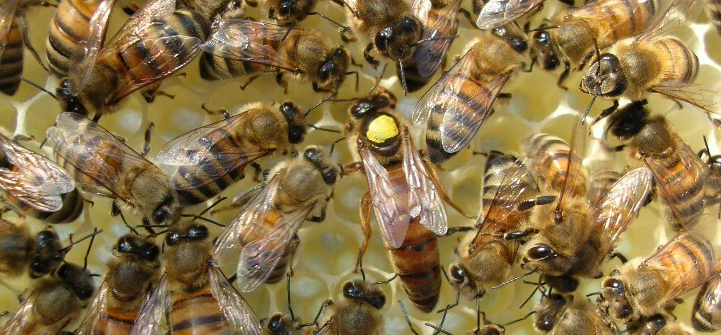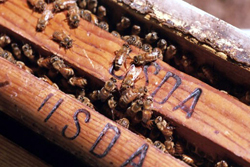The USDA-ARS sponsors five bee research labs at
- Baton Rouge, Louisiana
- Beltsville, Maryland
- Logan, Utah
- Tucson, Arizona.
- Weslaco, Texas
Honey Bee Breeding, Genetics and Physiology Research Unit
Baton Rouge, Louisiana bee lab
Mission:
The mission of the Honey Bee Breeding, Genetics and Physiology Research Unit is directly related to improving honey bee stock and honey bee management. This broad mission includes components related to problems caused by varroa mites, tracheal mites and Africanized honey bees. The devastating problems caused by varroa mites and the serious problems caused by tracheal mites are targeted as the most critical. Scientists are engaged in breeding and testing honey bees for resistance to mites, evaluating mite-bee interactions to better describe breeding criteria, and evaluate stock production processes to explore and solve stock problems caused by mites.
Bee Research Laboratory in Beltsville
Mission:
The mission of the Bee Research Laboratory in Beltsville is to conduct research on the biology and control of honey bee parasites, diseases, and pests to ensure an adequate supply of bees for pollination and honey production. Using biological, molecular, chemical and non-chemical approaches, scientists are developing new, cost-effective strategies for controlling parasitic mites like Varroa destructor, bacterial diseases like American foulbrood, and emergent pests like the small hive beetle. Additional research focuses on virus transmission, and the impact of pests and pathogens on longevity and colony survival. Bee Research Laboratory staff also provides authoritative diagnosis of bee diseases and pests for Federal and State regulatory agencies and beekeepers on a worldwide basis.
Pollinating Insects – Biology, Management and Systematics Research Unit
Mission:
The mission of the Pollinating Insect-Biology, Management, Systematics Research is the development of non-Apis bees, for example the alfalfa leafcutting bee and the blue orchard bee, as crop pollinators. Research emphasis areas include the development and improvement of management systems for bee populations, biological studies of bees, plant-pollination systems, and bee biosystematics. Cross-pollinated crops not effectively pollinated by honey bees have been targeted for improved pollination management, and the candidacy of selected pollinator species continues to be evaluated. Current research on established species, like the alfalfa leafcutting bee and the blue orchard bee, is directed toward developing control programs for pests and diseases, improving management that will result in better bee health and demonstrating pollination efficacy and increased producer profitability on “new” crops.
Carl Hayden Bee Research Center
Mission:
The mission of the Carl Hayden Bee Research Center (CHBRC) is to conduct research to optimize the health of honey bee colonies, through improved nutrition and control of Varroa mites, in order to maximize production of honey bee pollinated crops.
Honey Bee Research Unit (HBRU) at Kika de la Garza Subtropical Agricultural Research Center
Mission: The mission of the Honey Bee Research Unit (HBRU) is to develop technology for managing honey bees in the presence of africanized honey bees, parasitic mites, stress and diseases. This lab was shut down in 2012. Many of the researchers migrated to the Carl Hayden Bee Lab in Tucson Arizona.

